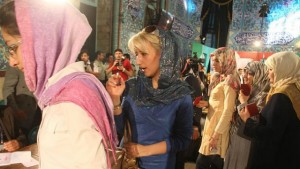Home » Commentary » Opinion » While women overseas face true oppression, Western feminists dream up petty hashtags
· Daily Telegraph

 In August 2014, 12 members of Iran’s Revolutionary Guard charged into 28-year-old artist Atena Farghadani’s house, blindfolded her, and took her to prison.
In August 2014, 12 members of Iran’s Revolutionary Guard charged into 28-year-old artist Atena Farghadani’s house, blindfolded her, and took her to prison.
She had posted a satirical cartoon on Facebook to protest proposed legislation to restrict birth control and women’s rights. Farghadani has since been found guilty of “spreading propaganda” and “insulting members of parliament through paintings.” She has been sentenced to 12 years in prison.
Farghadani is one of millions of women whose basic rights are being ruthlessly violated. In countries like Iran, Yemen, Egypt, and Cambodia, women are struggling for freedoms most women in the West take for granted.
But American feminists are relatively silent about these injustices — especially feminists on campus. During the 1980s, there were massive demonstrations on American college campuses against racial apartheid in South Africa. There is no remotely comparable movement on today’s campuses against the gender apartheid prevalent in large parts of the world. Why not?
Today’s young feminist activists are far too preoccupied with their own supposed victimhood to make common cause with women like Farghadani.
It’s not that they don’t feel bad for women in places like Iran or Yemen. They do. But they believe they share a similar fate.
And they can cite a litany of victim statistics from their gender studies class that shows their plight. Someone needs to tell them that most of those statistics are specious and that, although the threat of harm is a human constant, they are among the most liberated and privileged — and safest — people on earth.
Samantha Power, the able US ambassador to the UN and human rights champion, recently addressed the graduating class of Barnard College. Instead of urging them to support women struggling against oppression in places like Afghanistan, she congratulated them for waging a parallel struggle on the US campus.
She cited Emma Sulkowicz — a much-publicised Columbia University student who carried a mattress for months to protest her alleged rape by a fellow student — as a symbol of ongoing oppression of US women, and compared her plight with those of young women in Afghanistan struggling for elementary gender justice.
Never mind that a campus discipline committee found the accused not guilty; never mind the questionable basis of Sulkowicz’s public shaming campaign. Sulkowicz lives in a country where laws, institutions, and customs protect her. The women of Afghanistan do not. Afghan women are coping with the Taliban; Sulkowicz is coping with Columbia classmates. The US ambassador to the UN should be able to distinguish the two.
It is not my view that because women in countries like Iran or Afghanistan have it so much worse, Western women should tolerate less serious injustices at home. Emphatically they should not.
But too often, today’s gender activists are not fighting injustice, but fighting phantom epidemics and nursing petty grievances. Two leading feminist hashtags of 2015 are #FreeTheNipples and #LovetheLines. The former is a campaign to desexualise women’s breasts; the latter promotes stretch-mark acceptance. If the imprisoned women of Iran and Afghanistan were free to tweet, what would they say about these struggles?
Several years ago the American philosopher Martha Nussbaum created a small furore when she noted with disapproval that “feminist theory pays relatively little attention to the struggles of women outside the United States.” Her academic colleagues pounced: Gayatri Spivak, professor of comparative literature at Columbia, accused Nussbaum of “flag waving” and of being on a “civilising mission.”
No one is suggesting American or Australian women take on the role of moral saviours out to civilise the rest of the world. Efforts to help can often be patronising and counterproductive.
But that is an argument for being tactful and for taking direction from the women we are seeking to support. It is not, for those who claim to be devoted to gender justice, an excuse for doing nothing. Women like Atena Farghadani are already on a civilising mission — and it is disheartening so many feminists in the West seem to be looking the other way.
Christina Hoff Sommers is a resident scholar at the American Enterprise Institute. She is the author of several books including Who Stole Feminism and The War Against Boys and hosts the weekly video blog, The Factual Feminist. This piece is an adaptation of her address to the Centre of Independent Studies Big Ideas forum: Why ‘Grievance Feminism’ is a Threat to Serious Feminist and Humanitarian Issues.
While women overseas face true oppression, Western feminists dream up petty hashtags